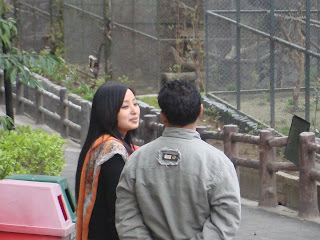Journalists, I realise, need to create controversy to keep their presses rolling, their satellites humming. They have intentionally maligned not just the place, but the people who live there by making us who live in the plains paranoid about unrest and agitation. They have quite blatantly gone about making Gorkhaland the issue. Gorkhaland is not an issue. It is political machination at its worst. Small conversations with local people and this truth is quite apparent.
Let's be quite clear about one thing: Darjeeling is first and foremost a place for tourists. The tea industry comes next in terms of importance. But I seem to be guilty of the very thing that I am bemoaning. So I will correct myself: Darjeeling is first and foremost about its people and its vibrant admixture of cultures. This is the second reason for its once bustling tourism. The first reason is because of its climate. In one or two words: wonderful, glorious, rejuvenating, enthralling, ecstatic, inspiring... So its more than two words. You could find even more to describe it when you visit.
The British used India to experiment with. To experiment with politics and military, with wile and guile. Yet they also experimented with their adventurous spirit, their skills, their learning and their determination to forge ahead with new developments and pioneering ways. It is this second experiment which has left us a legacy worth wanting and keeping. The first has merely multiplied the disastrous methods independent India has worked out for itself which is reflected in our governance and policy making.
Darjeeling is a consequence of one of those second legacies. And it will soon become a ruined victim, a result of the first legacy of political wile and guile, if it hasn't already. British engineers and other skilled types made the road up from the plains to this once presumably forlorn village belonging to the Sikkim royals. They made the fantastic metre-gauge railway hug the curves of the verdant mountains and turned it into what I feel is a mobile work of art. They set up tea plantations to give us our morning/afternoon/evening and in-between cuppas. And to maintain it all, they did the next obvious thing of wile and guile
Obviously, it all came at tremendous cost, but I don't have any figures for it, so I can only guess. The original inhabitants would have been the prime sufferers. Ousted and deprived of land and property, they would have joined the ranks of labourers building British edifices on the very land they may have been removed from, and perhaps hustled into serving the ruling class as domestics and guards. Finally these folk would have had to stand by and see people from other parts come in, settle down, and make more money from their labours than they ever would or did. A very plausible scenario since it was more or less the same in other parts of British ruled India.
But to return to the present day and pleasurable aspects of this hill station, Darjeeling, I like to believe has a healing air to it. It was recommended by our family doctor when I was 8 or 9 years old and an extremely sickly child, to be removed to Darjeeling for school. The doctor was confident that the fine climate up here near the Himalayas would cure me of various illnesses which were otherwise surely leading me to an early death. He was right. I'm still around to write of it!
Every day of the five days we were there, I walked and walked and walked. At night when I slept, it was from a healthy exhaustion, and not the kind of burned-out unconsciousness that one calls sleep in the city. I ate much more than I normally do in Calcutta, and was able to digest it all without problem. Like all mountainous regions I have ever visited, I want to live here.
Life happens at its own pace here. You can't come to Darjeeling from urban despair and hope to change it around to what you're used to. I bump into Karma near the Mall, a young Nepali I know from work we did together in Calcutta. His parents live here and he's taking a break as well. He tells me he cannot ever come back to make a life in Darjeeling. Then there's Uttam, another Nepali with a well-located restaurant on the Chowrasta, who after having tried to study law, decided to return, “as there's no place better than Darjeeling”. Karma is young and has got a lot of life to go through before he gets to Uttam's way of thinking. Me? I'm with Uttam.
Just one hazy glimpse of the majesty of the Kanchendzonga peak and the eastern Himalyan ranges is enough to make me absolutely reluctant to return to the plains. I got just one day of “snow view” as they call it, but that was greater than anything I might have wanted here. I watched a lazy plume of what looked like smoke blowing off the peak of the world's 3rd highest peak. It of course was not smoke, but a snowstorm, whcih eventually affected the climate for the next 3 days of my stay in Darjeeling. I never saw the peaks again after that, but we did get the other kind of fanciful weather. Mist-shrouded walks down roads edged with pine trees, a light but persistent rain resulting in a 5 degree drop in temperature in under 2 hours, and the stray sunshine that warmed the cockles of my heart.
I will return to Darjeeling of course. Soon and very soon. There are ideas i have discussed with Uttam and others and perhaps one can work out a way of living that will give one urban convenience and the mountain plenty.
*******
For more of my pictures of Darjeeling, go here.








